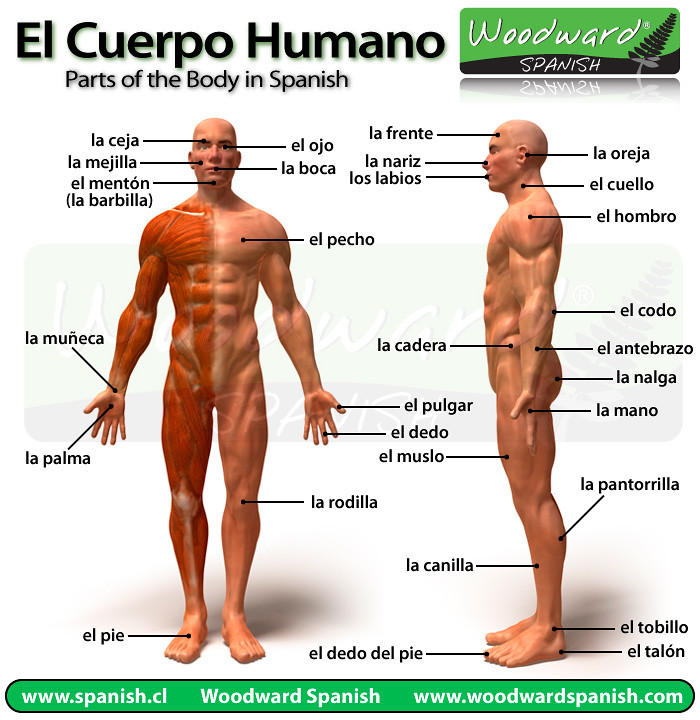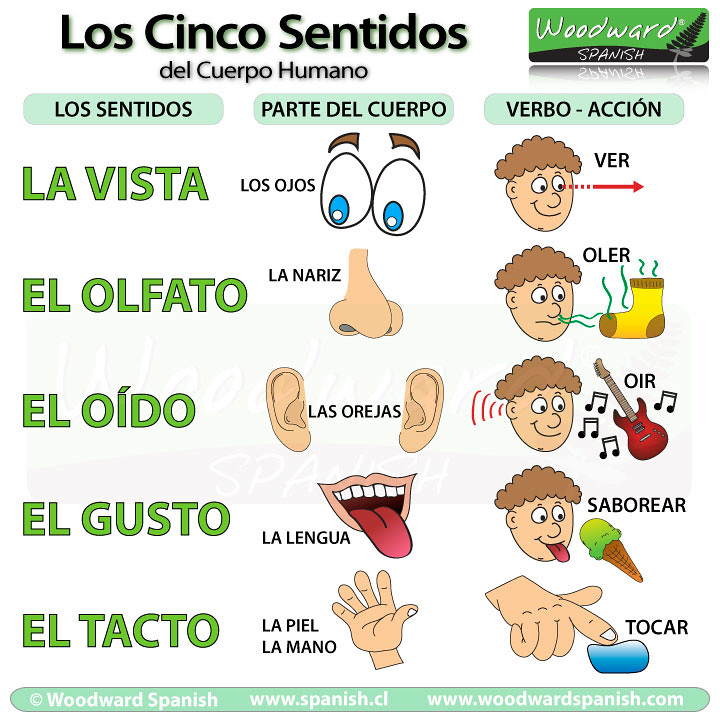Semana 4 (Más ser, países y el cuerpo)
Expresar origen, el verbo "ser"
¿Recuerdas la conjugación de "ser?
| Ser--to be | |||
|---|---|---|---|
| yo | soy | nosotros/as | somos |
| tú | eres | vosotros/as | sois |
| Ud. | es | Uds. | son |
| él, ella | es | ellos, ellas | son |
¿Cuándo usamos “SER” en español?
- Para identificar/ describir
- Soy morena y soy simpática.
- También usamos "ser" para hablar de nacionalidad y origen (identificación)
- Soy de España.
- I am from Spain. Notice “DE” (from) after ”ser” when followed by the country/state/city’s name.
- The question ¿De dónde eres? is "Where are you from?"
- Soy ecuatoriana.
- I am Ecuadorian. No ”DE” when using the adjective (instead of the country).
- Soy de España.
¿Dónde colocamos los adjetivos?
¿Cómo funcionan los adjetivos en español?
- con el mismo (same) género y número que el sustantivo al que acompañan.
- detrás del sustantivo (after the noun--those adjectives that are descriptive, providing specific or differentiating details)
- las botas negras
- antes del sustantivo (before the noun--those include numbers, possessives, and subjective or emotional judgements, or inherent characteristics)
- cuatro sillas
- mi casa
- blanca nieve
- algunos adjetivos cambian de significado (change meaning) si van antes o después.
- pobre
- pobre hombre (no tiene vida buena, o suerte, o no tiene amigos)
- hombre pobre (no tiene dinero)
- viejo
- viejo amigo (son amigos mucho tiempo [long-standing]
- amigo viejo (mi amigo tiene muchos años [old man])
- nuevo
- nueva casa (just acquired, new to you, maybe built years ago)
- casa nueva (just built, brand new)
- antiguo
- antiguo carro (former, one you used to have)
- carro antiguo (antique car, from the 50's)
- bueno
- buen estudiante (good student)
- estudiante bueno (a good person who is a student)
- grande
- gran libro (great--quality, loses the ending "-de")
- libro grande (big--size)
- pobre
El cuerpo humano

https://youtu.be/dBTGxLc-lv0?si=2z3JTEAw5N2gwwQH Billy la Bufanda

Vocabulario de los cinco sentidos
| la vista | sight | el olfato | smell | el oído | hearing | el gusto | taste | el tacto | touch |
|---|---|---|---|---|---|---|---|---|---|
| brillante | bright | apestoso | smelly/stinky | ruidoso | noisy | agrio | sour | áspero | rough |
| borroso | blurry/fuzzy | quemado | burned | zumido | buzzing | dulce | sweet | suave | soft |
| colorido | colorful | mohoso | moldy | susurro | whisper | amargo | bitter | liso | smooth |
| vistazo | peek, quick look | ahumado | smoky | callado | quiet, silent | salado | salty | baboso | slimy |
| mirada | look (way of looking) | fragante | fragrant | gotear | to drip | ácido | tart, tangy | duro | hard |
| arrugado | wrinkled | podrido | rotten | golpe | knock | jugoso | juicy | afilado | sharp (edge) |
| chispeante | sparkling | olisquear | to sniff | silbar | to whistle | probar | to taste, try | pegajoso | sticky |
| sombra | shadow | perfumado | scented | gruñir | to growl | insípido | bland, tasteless | frotar | to rub |
| vislumbrar | to peer, to make out | olor | odor | ladrido | barking | picante | spicy | apretar | to squeeze |
| ojear | to glance, scan | huele a... | smells like... | rugir | to roar | fresco | fresh | esponjoso | spongy, fluffy |
¿Qué hay en tu cara?
¿Qué parte del cuerpo usas para ponerte (put on) ropa?
¿Dónde está tu nariz?
¿Qué parte del cuerpo está entre tus brazos?
¿Cómo es (no cómo está) tu mejor amigo/a?
¿Qué ropa llevas cuando tienes frío?
¿Qué parte del cuerpo usas para ponerte (put on) ropa?
¿Dónde está tu nariz?
¿Qué parte del cuerpo está entre tus brazos?
¿Cómo es (no cómo está) tu mejor amigo/a?
¿Qué ropa llevas cuando tienes frío?

